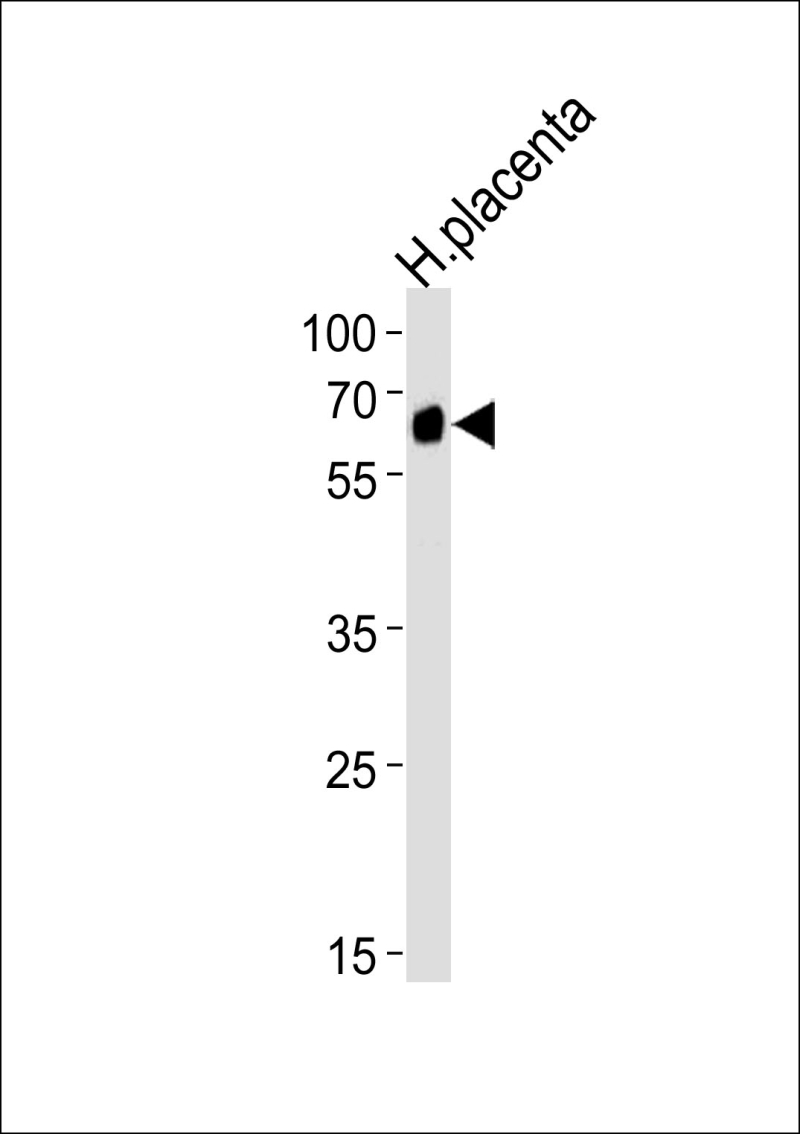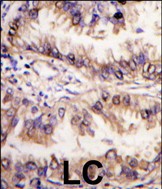

| WB | 咨询技术 | Human,Mouse,Rat |
| IF | 咨询技术 | Human,Mouse,Rat |
| IHC | 1/100-1/500 | Human,Mouse,Rat |
| ICC | 技术咨询 | Human,Mouse,Rat |
| FCM | 咨询技术 | Human,Mouse,Rat |
| Elisa | 咨询技术 | Human,Mouse,Rat |
| Aliases | STE20/SPS1-related proline-alanine-rich protein kinase, Ste-20-related kinase, DCHT, Serine/threonine-protein kinase 39, STK39, SPAK |
| Entrez GeneID | 27347 |
| WB Predicted band size | 59.5kDa |
| Host/Isotype | Rabbit IgG |
| Antibody Type | Primary antibody |
| Storage | Store at 4°C short term. Aliquot and store at -20°C long term. Avoid freeze/thaw cycles. |
| Species Reactivity | Human, Mouse, Rat |
| Immunogen | This SPAK (STK39) antibody is generated from rabbits immunized with a KLH conjugated synthetic peptide between 386-415 amino acids from the C-terminal region of human SPAK (STK39). |
| Formulation | Purified antibody in PBS with 0.05% sodium azide. |
+ +
以下是关于SPAK (STK39)抗体的参考文献示例:
1. **"STK39/SPAK phosphorylation of cation chloride transporters: Key roles in blood pressure regulation"**
- **作者**: Richardson C, et al.
- **摘要**: 该研究探讨了SPAK激酶通过磷酸化NKCC2和NCC等阳离子氯离子转运蛋白调控离子平衡的机制,并利用特异性抗体验证其在肾脏组织中的活性,揭示了其在高血压病理中的作用。
2. **"Development of a monoclonal antibody targeting SPAK for functional analysis in cellular models"**
- **作者**: Lee S, et al.
- **摘要**: 研究团队开发了一种高特异性抗SPAK单克隆抗体,通过免疫沉淀和免疫印迹验证其效能,并用于研究SPAK在细胞体积调节和渗透压应激中的功能。
3. **"SPAK-OSR1 signaling mediates angiotensin II-induced vascular fibrosis via NCC activation"**
- **作者**: Zhang Y, et al.
- **摘要**: 该文献利用SPAK抗体检测血管平滑肌细胞中SPAK/OSR1信号通路的表达,发现其通过激活NCC促进血管纤维化,为心血管疾病治疗提供新靶点。
4. **"Tissue-specific expression of SPAK kinase revealed by immunohistochemical analysis"**
- **作者**: Tanaka K, et al.
- **摘要**: 通过免疫组化结合SPAK抗体,研究揭示了SPAK在肾脏、脑和心脏中的差异表达模式,强调了其在器官特异性离子稳态中的调控作用。
(注:上述文献为示例性内容,实际引用需根据真实数据库检索结果调整。)
SPAK (STE20/SPS1-related proline-alanine-rich kinase), encoded by the STK39 gene, is a serine/threonine kinase belonging to the STE20 kinase family. It plays a critical role in regulating ion transport and cellular stress responses, primarily through its interaction with cation-chloride cotransporters (CCCs) such as NKCC1 (Na⁺-K⁺-2Cl⁻ cotransporter 1) and NKCC2. SPAK is activated by WNK (With-No-Lysine) kinases via phosphorylation, forming a signaling cascade that modulates electrolyte homeostasis, cell volume regulation, and blood pressure control. Dysregulation of SPAK has been implicated in hypertension, neurological disorders, and renal dysfunction.
Antibodies targeting SPAK are essential tools for studying its expression, localization, and activation status in various tissues, particularly in the kidneys, brain, and vascular system. These antibodies enable detection of SPAK’s phosphorylated forms (e.g., at Thr243/Thr247 in humans), which reflect its kinase activity. Research applications include Western blotting, immunohistochemistry, and immunofluorescence to explore SPAK’s role in osmotic stress responses, ion channel regulation, and disease mechanisms. Additionally, SPAK inhibitors are being investigated as potential therapeutics for hypertension, making specific antibodies crucial for validating target engagement in preclinical studies. Understanding SPAK’s signaling network continues to advance insights into cellular ion balance and related pathologies.
×